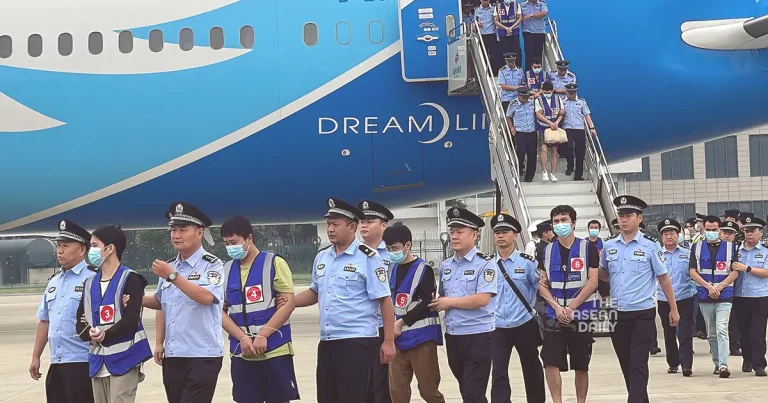6-12-2023 (BANGKOK) China is intensifying efforts to combat online scams orchestrated by criminal syndicates operating in the border areas of military-ruled Myanmar. The crackdown, marked by a shootout, confession videos, and televised arrests of high-profile suspects, aims to address the rampant illicit activities, including human trafficking, defrauding individuals of their savings through phone calls and online schemes, which collectively generate billions of dollars annually.
The initiative, however, is geographically limited and appears unlikely to dismantle the key figures orchestrating these criminal activities. Despite joint operations with neighboring countries over the summer, the campaigns did not result in the arrest of ring leaders in Myanmar.
China’s Ministry of Public Security recently announced that approximately 31,000 suspects, including 63 key players of scamming groups, had been handed over by authorities in northern Myanmar. While experts commend China’s focus on cleaning its border, doubts persist regarding the campaign’s effectiveness in eradicating the root causes.
The Kokang Self-Administered Zone and the Wa Self-Administered Division, both sharing a border with China, have witnessed arrests linked to powerful individuals within their communities. These regions, heavily influenced by China, have close cultural and linguistic ties with the country.
In mid-November, arrest warrants were issued for four individuals surnamed Ming, suspected of involvement in cyberscams, murder, and illegal detention. The Ming family, influential in Kokang, faced arrests, with one alleged leader reportedly committing suicide during a police attempt to apprehend him.
The crackdown gained momentum following a violent shootout on October 20 in Kokang, involving undercover police allegedly killed by the Ming family. The Chinese state-backed news outlet Global Times suggested that the Ming family’s demise was a result of China’s determination to eradicate cyber scams in northern Myanmar.
Notably, the crackdown has also targeted other powerful Kokang families, further indicating China’s resolve. Videos circulated on Chinese social media featured Wei Qingtao, a member of another influential Kokang family, urging his relatives to release individuals coerced into scamming rings.
Arrest warrants were also issued for government officials in the Wa Division, highlighting the broad scope of the operation. The crackdown has become intertwined with Myanmar’s conflict, as ethnic armed groups launched an offensive against the army, aiming to defeat junta-backed forces and eliminate cyberscammers.
While China’s crackdown signals intolerance towards scams, questions persist about its comprehensiveness. Some argue that powerful figures, like Bai Suocheng, the military commander in charge of Kokang, associated with scams, have not faced repercussions. Critics emphasize that not all masterminds behind the scams have been apprehended, with concerns about the syndicates exploiting instability and corruption in border areas.
As the crackdown unfolds, challenges remain in gauging its long-term impact, with the financial incentive for these scams still prevalent despite increased risks. The ongoing situation underscores the complex dynamics between China, Myanmar, and criminal elements operating in the border regions.




